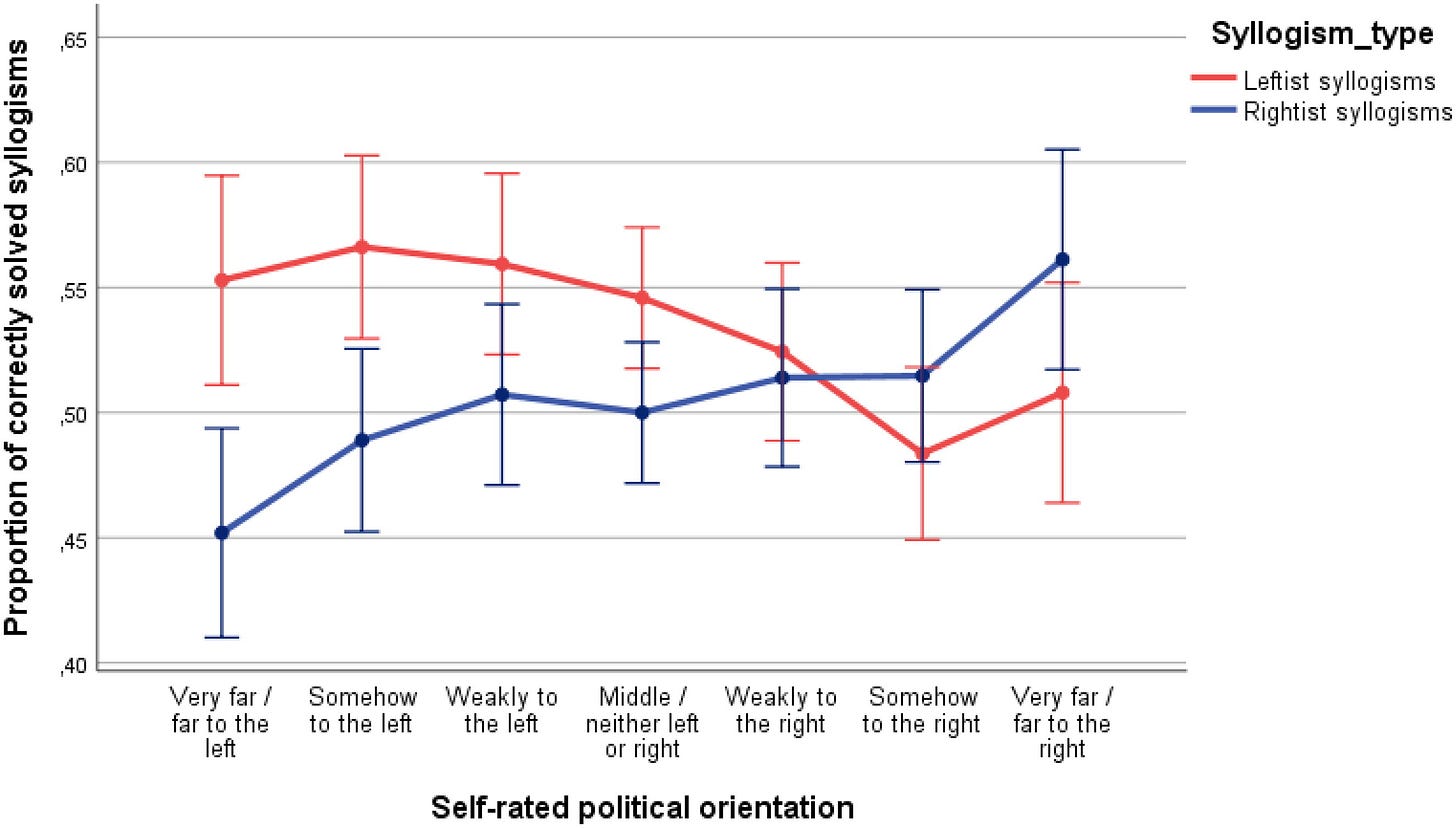Warning: Political Ideology May Impair Your Ability to Reason
Don't drink the Kool Aid

Imagine two people, one a staunch leftist and the other a die-hard rightist. Both pride themselves on their intelligence, their ability to analyze facts, and their commitment to rational thinking. Now, give them a simple logical problem - a syllogism - that if solved correctly, leads to a conclusion favoring the opposing ideology. Watch what happens next.
They stumble. They hesitate. They get it wrong.
This isn’t just speculation or anecdote; it’s a scientifically documented phenomenon. According to fascinating recent research by Julia Aspernäs, Arvid Erlandsson, and Artur Nilsson, political ideologies can literally impair people’s ability to reason.
Aspernäs and colleagues analyzed responses from a large, nationally representative Swedish sample (N = 1,005) who were presented with both political and non-political syllogisms. The results were striking: As shown in the graph, participants were significantly better at solving syllogisms when the correct answer was consistent with their own political beliefs, and significantly worse when it favored the opposing ideology. This ideological belief bias was particularly pronounced for hot-button issues such as asylum for refugees, climate change, and gender-neutral education.
The news isn’t all bad. The researchers also found that individuals who engage in more analytical thinking are somewhat immune to the reason-impairing effects of ideology. Admittedly, the impact of analytical thinking was modest and inconsistent. Still, the finding does show that reason can sometimes prevail.
What are the broader implications of the research? First, it’s a humbling reminder that no one is immune to motivated reasoning. We all have cognitive blind spots, and those fostered by our political convictions may be particularly powerful. Second, the research suggests that training ourselves in analytical thinking might help protect our ability to reason - but only if we’re willing to apply it even when (or especially when) the conclusions make us uncomfortable.
So, the next time you encounter a political argument that rubs you the wrong way, take a deep breath, step back, and ask yourself: “Am I actually thinking? Or am I just reacting?”
Because if you’re not careful, ideology won’t just shape your opinions; it’ll hijack your ability to reason altogether.
If you’d like to dig deeper into the research, the full paper, “Motivated Formal Reasoning: Ideological Belief Bias in Syllogistic Reasoning Across Diverse Political Issues,” is available for free here or here.
Follow me on Twitter/X for more psychology, evolution, and science.
How You Can Support the Newsletter
I love writing the Nature-Nurture-Nietzsche Newsletter - but it’s a lot of work! If you want to support my efforts, there are several ways you can do it.
Like and Restack - Click the buttons at the top or bottom the page to boost the post’s visibility on Substack.
Share - Send the post to friends or share it on social media.
If You Can Afford It, Upgrade to a Paid Subscription - A paid subscription will get you:
Full access to all new posts and the archive
Full access to exclusive content such as my “12 Things Everyone Should Know” posts, Linkfests, and other regular features
The ability to post comments and engage with the N3 Newsletter community.
If you could do any of the above, I’d be hugely grateful. The support of readers like you makes this newsletter possible.
Thanks!
Steve



Didn't they used to have debating teams where moderators would make you switch sides afterwards? So one had to be able to convincingly debate both sides of a question. Seems like a good exercise to bring back.